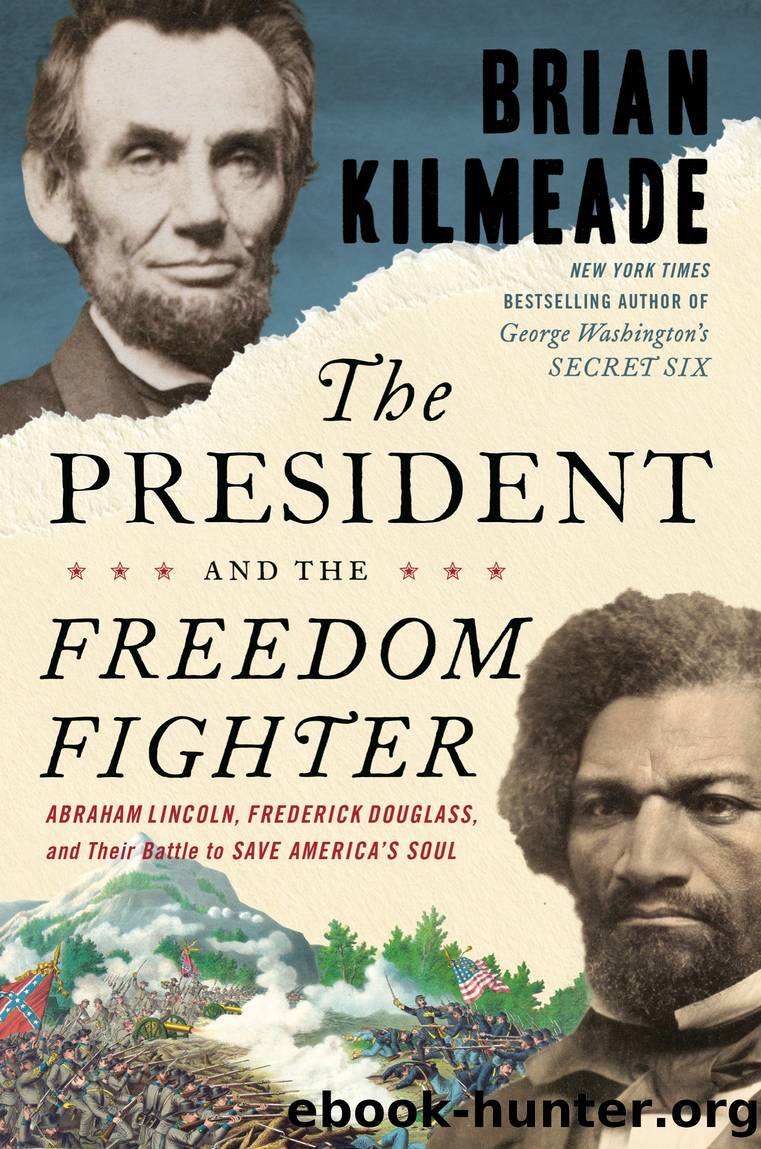The President and the Freedom Fighter by Brian Kilmeade

Author:Brian Kilmeade [Kilmeade, Brian]
Language: eng
Format: epub
Publisher: Penguin Publishing Group
Published: 2021-11-02T00:00:00+00:00
PROPOSAL NOT ACCEPTED
Though Frederick Douglass knew nothing about Lincolnâs July 22 meeting, he had plenty to say about a small, invitation-only gathering at the White House on August 14, 1862. Of the five Black guests, none was a well-known abolitionist or a man of national stature; four had been enslaved and not all could read and write. Even so, the meeting was unprecedented. No president had ever summoned a âDeputation of Negroes,â as Lincoln called it, to talk about a matter of national interest.
Though he did not utter the word, emancipation was the great weight that burdened Lincolnâs thoughts. If he were to free the enslaved, would his war strategy collapse like a house of cards? He understood that, as one senator told his brethren in the Capitol, âThere is a very great aversion . . . [to] having free negroes come among us.â20 Northern citizens who feared that freedmen would take their jobs and marry their daughters might reject such a change. Could emancipation lead to another secession? The departure of even one border state might just tip the balance in favor of the Confederacy.
After he shook hands with his Black guests, Lincoln began to talk about the relocation of people of African descent to other countries. This wasnât going to be an exchange of ideas about colonizationââI do not propose to discuss this,â he told his guestsâbut he wished to present a plan. And he wanted their cooperation.
As he rarely did, Lincoln talked at and down to his guests. âYou and we are different races. . . . Whether it is right or wrong I need not discuss, but this physical difference is a great disadvantage to us both, as I think your race suffer very greatly, many of them by living among us, while ours suffers from your presence. In a word, we suffer on each side. If this is admitted, it affords a reason why we should be separated. . . .
âThe institution of Slavery,â he continued, has âevil effects on the white race. See our present conditionâthe country engaged in war!âour white men cutting one anotherâs throats. . . . But for your race among us there would not be war.â
Lincoln offered a proposal. He wanted a vanguard of African American volunteers, prominent men and their families, to pack up and leave. He hoped their departure would launch an exodus. âI want you to let me know whether this can be done.â It would be, he concluded, âfor the good of mankind.â
His words were met by a stunned silence.
As the men rose to leave, one of them, a minister, promised to âhold a consultation and in a short time give an answerâ to Lincolnâs proposal.
âTake your full time,â Lincoln replied, âno hurry at all.â21
The audience ended, but a reporter from the New-York Tribune in attendance produced a full transcript of the meeting, and as Lincoln had hoped, many newspapers published in full what he had said. His words were a message intended to mollify a very much larger audience of White men.
Download
This site does not store any files on its server. We only index and link to content provided by other sites. Please contact the content providers to delete copyright contents if any and email us, we'll remove relevant links or contents immediately.
Kathy Andrews Collection by Kathy Andrews(10519)
The remains of the day by Kazuo Ishiguro(7551)
Spare by Prince Harry The Duke of Sussex(4195)
Paper Towns by Green John(4169)
The Body: A Guide for Occupants by Bill Bryson(3800)
Be in a Treehouse by Pete Nelson(3212)
Harry Potter and the Goblet Of Fire by J.K. Rowling(3043)
Goodbye Paradise(2962)
Never by Ken Follett(2880)
Into Thin Air by Jon Krakauer(2701)
The Remains of the Day by Kazuo Ishiguro(2617)
The Genius of Japanese Carpentry by Azby Brown(2609)
The Cellar by Natasha Preston(2595)
Drawing Shortcuts: Developing Quick Drawing Skills Using Today's Technology by Leggitt Jim(2532)
120 Days of Sodom by Marquis de Sade(2436)
Architecture 101 by Nicole Bridge(2350)
The Man Who Died Twice by Richard Osman(2298)
Machine Learning at Scale with H2O by Gregory Keys | David Whiting(2290)
Fairy Tale by Stephen King(2069)
